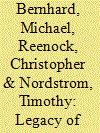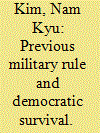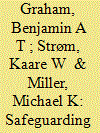| Srl | Item |
| 1 |
ID:
050914


|
|
|
| 2 |
ID:
177029


|
|
|
|
|
| Summary/Abstract |
Existing scholarship shows that a history of military rule increases the risk of democratic breakdown. However, scholars overlook the fact that military rule takes two distinct forms: collegial and personalist military rule. I argue that the two types of military rule provide different structural settings for post-authoritarian contexts. Collegial military rule hands over more cohesive and hierarchical militaries to their subsequent democracies than personalist military rule. These militaries remain organized, politicized, and powerful in emerging democracies, which increases the risk of military intervention and coups. I hypothesize that collegial military rule poses a greater threat to the survival of the ensuing democracies than personalist military rule. Empirical analysis reveals that democracies after collegial military rule are more likely to collapse than other democracies, including those emerging from personalist military rule. This shows that the previous finding on the detrimental effect of military rule is largely driven by collegial military rule.
|
|
|
|
|
|
|
|
|
|
|
|
|
|
|
|
| 3 |
ID:
156698


|
|
|
|
|
| Summary/Abstract |
Democracy is often fragile, especially in states recovering from civil conflict. To protect emerging democracies, many scholars and practitioners recommend political powersharing institutions, which aim to safeguard minority group interests. Yet there is little empirical research on whether powersharing promotes democratic survival, and some concern that it limits electoral accountability. To fill this gap, we differentiate between inclusive, dispersive, and constraining powersharing institutions and analyze their effects on democratic survival from 1975 to 2015 using a global dataset. We find sharp distinctions across types of powersharing and political context. Inclusive powersharing, such as ethnic quotas, promotes democratic survival only in post-conflict settings. In contrast, dispersive institutions such as federalism tend to destabilize post-conflict democracies. Only constraining powersharing consistently facilitates democratic survival regardless of recent conflict. Institution-builders and international organizations should therefore prioritize institutions that constrain leaders, including independent judiciaries, civilian control of the armed forces, and constitutional protections of individual and group rights.
|
|
|
|
|
|
|
|
|
|
|
|
|
|
|
|